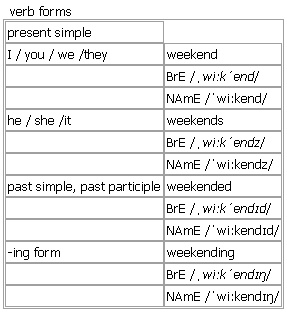|
Từ điển Oxford Advanced Learner 8th
 weekend
weekend

week·end [weekend weekends weekended weekending] noun, verb BrE [ˌwiːkˈend] NAmE [ˈwiːkend]
noun
1. Saturday and Sunday
• Are you doing anything over the weekend?
• Have a good weekend!
•It happened on the weekend of 24 and 25 April.
• (BrE)The office is closed at the weekend.
• (especially NAmE)The office is closed on the weekend.
• (BrE, informal)I like to go out on a weekend.
•We go skiing most weekends in winter.
see also ↑dirty weekend, ↑long weekend
2. Saturday and Sunday, or a slightly longer period, as a holiday/vacation
• He won a weekend for two in Rome.
•a weekend break
Culture:
weekends
The weekend lasts from the end of working hours or school hours on Friday until Monday morning. For most people it is a chance to be at home with their family, spend time on a sport or hobby or go out somewhere. Both adults and children look forward to the freedom of the weekend and to having time to please themselves. On Friday people with jobs may say TGIF (Thank God it’s Friday) and may go to a bar together after work. People who work in factories, shops and restaurants and on buses often have to work at weekends and instead get time off during the week. Sometimes people take an extra day off on Friday or Monday to make a long weekend, especially if they want to have a short holiday/vacation. Several holidays, such as ↑Memorial Day in the US and ↑Spring Bank Holiday in Britain, are on a Monday in order to create a long weekend.
At the weekend (AmE On the weekend) people may do jobs around the house, look after their garden, wash the car, play sport or watch television. On Saturday mornings many US television channels show cartoons. The weekend is also the busiest time of the week for shopping. Shops are open on both Saturday and Sunday. For a long time many British people opposed Sunday trading and wanted to ‚keep Sunday special’, but there was pressure from some of the larger stores and ↑DIY shops to be allowed to open, and now many people like shopping on a Sunday.
Friday and Saturday nights are popular, especially among young people, for parties and visits to clubs and ↑pubs. People also go to the theatre or cinema, eat out at a restaurant, or invite friends to their house for dinner or a barbecue.
On Sundays many people have a lie-in (= stay in bed longer than usual). Some people go to church on Sunday morning. In the US many adults enjoy reading the newspaper while eating brunch, a combination of breakfast and lunch that includes dishes from both. Brunch is eaten between about 10 and 12 in the morning and is enjoyed in a relaxed atmosphere. In Britain some people sit around and read the Sunday papers. They may have other members of the family round for Sunday lunch. Many people go out for a walk or visit a theme park, ↑stately home or other attraction, depending on their interests. In summer many families go out for the day to the countryside.
In general people are very busy at the weekend and often finish it more tired than they began it, so for many Monday morning is the least pleasant part of the week.
Example Bank:
•He called me on the weekend.
•I spent the last rainy weekend cleaning the kitchen.
•I took Friday off, and spent a long weekend visiting friends.
•It will be a wet weekend for much of England and Wales.
•The children play there on a weekend.
•The office is closed over the weekend.
•We spent the weekend in Paris.
•What are you doing at the weekend?
•What do you usually do at weekends?
verb intransitive + adv./prep.
to spend the weekend somewhere
• They're weekending in Paris.
Verb forms: 
|
|
|
|
